Paris Saint-Germain – Bayern Munich: Díaz’s Decisive Double Defeats the Reigning European Champions (1-2)
In the highlight fixture of the star-studded Champions League week, Paris Saint-Germain and Bayern Munich delivered an entertaining spectacle. The visitors dominated the early stages before the Parisians crept back to try and secure a comeback. However, a narrow one-goal margin separated them, with the red-carded Luis Díaz’s brace enough for Vincent Kompany to extend Bayern’s impressive win record to sixteen games.
Tactical analysis and match report by Fahd Ahmed.
We decided to make this article free to read. If you want to support our work, consider taking a subscription.
Paris Saint-Germain and Bayern Munich are two of the favorites to lift the Champions League trophy this season, and so a clash between the heavyweights was bound to provide an entertaining match. Luis Enrique and Vincent Kompany have established overlapping tactical strategies, with their sides fluid during possession phases whilst being intense without the ball. Of course, the finer details in their systems differ. Nevertheless, they seemingly also extract the best qualities of their star players whilst being fun for the spectators to watch.
The two have had slightly different starts to the 2025–26 season, however. PSG have been plagued with injury problems, with key players sidelined for numerous weeks. Still, their record so far has been solid, having lost just one match narrowly against Marseille. Compared to the high standards they set at the latter end of their treble-winning campaign, a slight drop was expected and understandable given the injuries.
Vincent Kompany’s team, on the other hand, have been perfect in 2025–26. Their record has only included wins, with dominant performances like their 6–0 against RB Leipzig, 3–1 against Chelsea, and even last weekend, a 3–0 victory against Bayer Leverkusen despite not fielding their strongest eleven.
Enrique fielded many of the players that started against Nice during the weekend. There were only three changes, with Ilya Zabarnyi, João Neves, and Senny Mayulu benched for Marquinhos, Fabián Ruiz, and Ousmane Dembélé, respectively. Bayern had six changes to the side that faced Leverkusen since Kompany had rested the majority of the key personnel ahead of the crucial Champions League tie. Hence, Dayot Upamecano, Josip Stanišić, Aleksandar Pavlović, Luis Díaz, Michael Olise, and Harry Kane returned to the team.
The Tuesday night clash was a re-run of the Club World Cup semi-final, which was an entertaining high-octane competition. The same energy was expected to be matched, and the two teams did not fail in that regard.
Man-oriented press delivers for Díaz’s opener
Enrique and Kompany prefer their teams to press the opposition man-to-man in the middle and attacking thirds whilst doing so with intensity and coordination. This can put off the players on the ball as they are rushed to make decisions. Even if they are top-quality with the ball, pressuring the opponents to hit the pass with the slightest effect in accuracy or power might just be enough to win the ball back and counter quickly. The pressure on the receiver could also force a loose touch if the player has not scanned well to notice the direction from which the defender is coming.
Interestingly, Serge Gnabry’s press on Willian Pacho did not put him off from playing an accurate pass. It did find the intended receiver, Nuno Mendes, between the lines. However, the PSG left-back did not scan before taking the touch and turned toward the onrushing Upamecano, who had also done well to anticipate the pass and proactively jumped up.
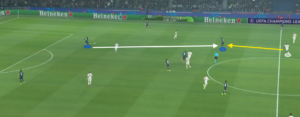
Pacho’s pass toward Mendes was accurate. However, the fullback did not scan his surroundings and identify the on-rushing Upamecano. This led to the counter from which Díaz scored.
This immediately led to a turnover from which Bayern sprung a swift counter. Olise did not convert the shot as he did not get the right connection with the ball. However, Díaz was in the right place at the right time to pounce on the rebound and score despite Marquinhos’ block attempt close to the goal line. It is worth noting that the Colombian winger has enjoyed a flying start at his new club after the big money move from Liverpool in the summer, which came under some sceptics.
The importance of Kvaratskhelia and Barcola to progress through the thirds
The Bayern press did not just result in the goal but generally made it difficult for the home side to progress through the thirds. This does not mean that they were always prevented from progressing as the wingers, Khvicha Kvaratskhelia and Bradley Barcola, proved that they could be the outlets. Whether it be through direct balls behind the Bayern defensive line or in one-versus-one situations against the opposition fullbacks, PSG had opportunities to generate attacks. Even for Dembélé’s disallowed goal, the connection between Kvaratskhelia and Barcola is evidently crucial for crafting that chance.
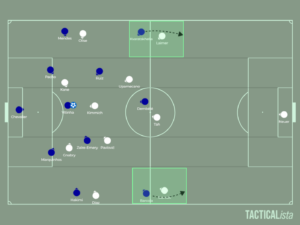
Kvaratskhelia and Barcola presented themselves as avenues for PSG to bypass the Bayern press through runs beyond the opposition backline or one-versus-one situations against the fullbacks.
The Marquinhos error and Díaz’s red card blunder
PSG supporters might have hoped that poor on-ball scanning would not hurt them again, but that did not prove to be the case. After collecting a loose ball, Marquinhos simply took way more time than he should have to release a pass. Furthermore, he was not aware of Díaz’s movement, leading to a dangerous high turnover that resulted in another goal for the visitors.
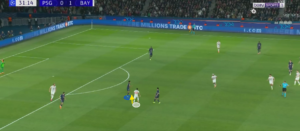
Marquinhos was unaware of Díaz’s pressure, resulting in a costly possession loss.
Díaz had a third significant moment in the game, but it was not to seal his hat-trick but rather to get a red card for a terrible challenge on Achraf Hakimi. This provided PSG with a lifeline to close the two-goal deficit.
Shifting the momentum in the second half
Unsurprisingly, PSG began mounting pressure as soon as the referee blew the whistle to commence the second half. Furthermore, with Kompany substituting Gnabry for Tom Bischof, who played at left-back, the strategy was clear – sit back and defend the lead. This is completely unlike them, as Bayern rarely defend zonally. However, with a man down, Bayern obviously could not deploy their usual defensive approach.
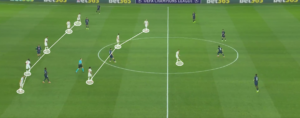
Bayern defended zonally in the second half after Díaz was sent off.
Meanwhile, PSG enjoyed more possession and attempted to break down Bayern from their usual 3-1-6 structure. However, they did find it difficult to pierce through the opposition defensive block, which was a little bit of a surprise. Bayern are a team that have brief periods in games where they defend deep in their third but managed to fend off PSG for almost half an hour with ten men.
The clean sheet only lasted until the 74th minute, with a cross from the substitute, Kang-in Lee, directed to the far post, where there was an overload three-versus-three, resulting in an easy tap-in for Neves.
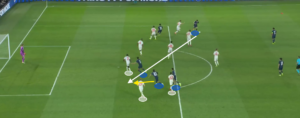
Neves pulled one back for PSG after a clever run to the back post was met with a cross from Lee, which was converted.
With Bayern defending in a low block, PSG had to rely on clever movements to break through, which they soon did after Neves’ goal. There was a chance for Warren Zaïre-Emery in the 78th minute after a late run to crash the box and receive a pass from Lee. His shot was directed toward the goal but was denied by Manuel Neuer’s timely save. That was soon followed by another close attempt from PSG – this time from Neves again, with his header after a cross narrowly missing the near post.
The Parisians piled on the pressure in the closing stages but could not find the equalizer despite coming close. Neuer was solid in goal, with a slice of misfortune also playing its part.
Takeaways
Enrique would likely revisit the first half of that match to investigate the reasons why PSG were unable to establish control. Furthermore, he would also go over the importance of scanning when receiving the ball in any third with his players. Against similar teams that are elite off the ball, it is vital to always stay switched on, which PSG did not do.
Kompany was ecstatic after the final whistle blew, and understandably so. Although Bayern leaked a few chances in the second half with ten players on the field, they still held off the reigning European champions who defeated them just a few months ago. That was a significant win as they passed another litmus test to prove to their competitors that they are the best right now. Yet, these are just the beginning months of the campaign, with a long way still to go.
Kompany’s words after the game were a perfect encapsulation of the above, as he said, “I always tell my players: ‘When there’s hype, please don’t believe it, you’re not that good – and when you lose a game or you have a bad performance, don’t believe that you’re bad, you’re not that bad’ – that’s something I always keep with me. Now we’ve won 16. But from tomorrow it’s back to zero, and we have to win the next game.”
Use the arrows to scroll through all available match plots. Click to enlarge.
Check the match plots page for plots of other matches.


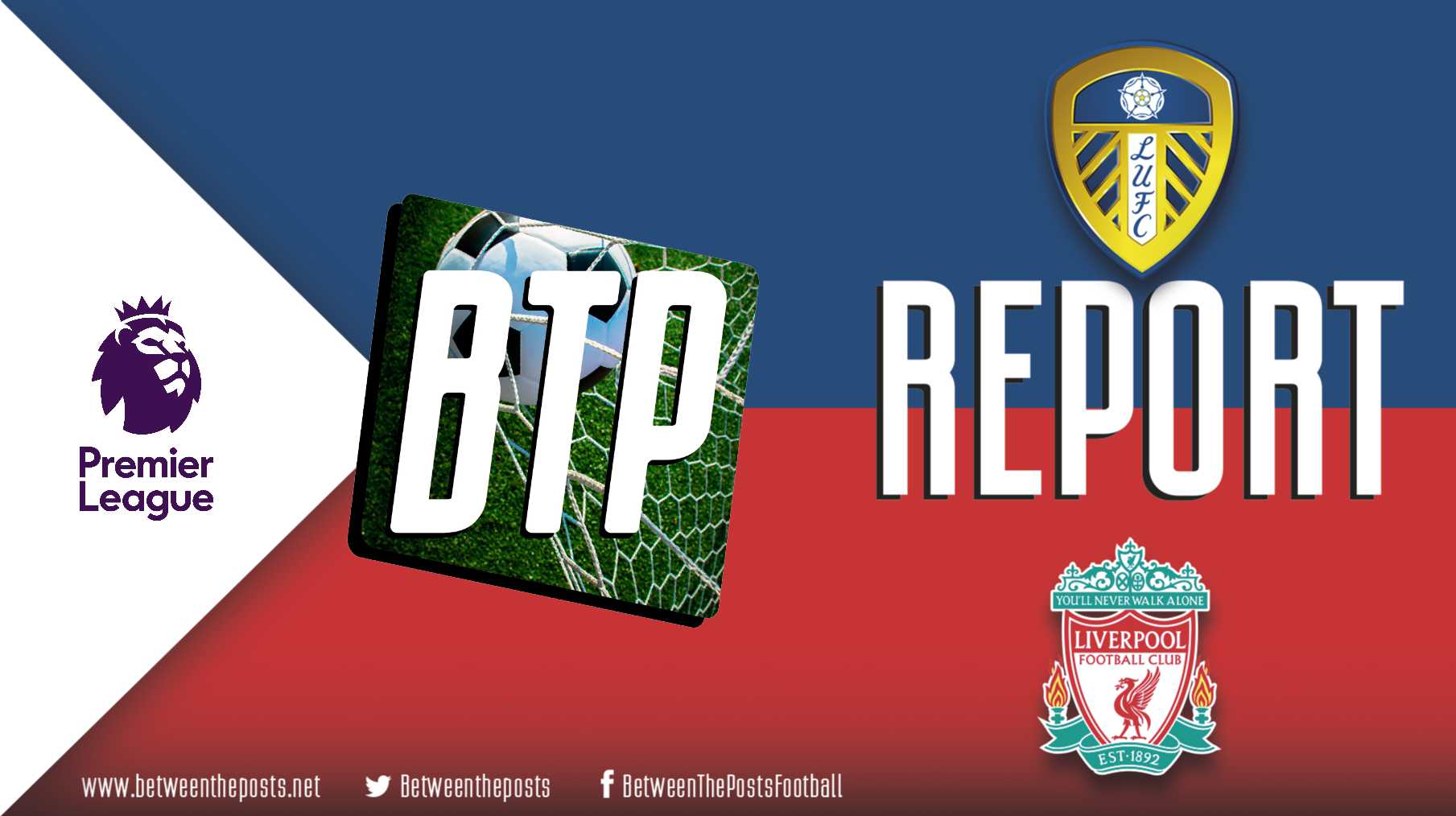

Comments